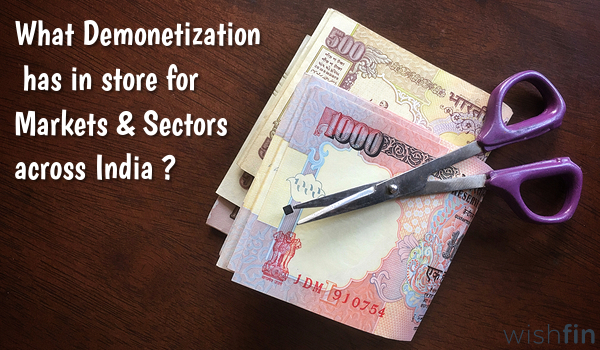What Demonetization has in Store for Markets & Sectors Across India?

Last Updated : March 17, 2017, 12:49 p.m.
Bringing the billions into raptures and sending shockwaves across few sections of the country, the Prime Minister Narendra Modi gave a deadly blow to black money circulation by demonetising Rs. 500 and Rs. 1,000 on Nov 8, 2016. The government's move is applauded by many due to the economic benefits that it promises to deliver. However, there is no denying of the fact that the move would lead to disruption across some sectors. So, it's time to introspect and find out who will unleash and who will bite the dust.
Eat Your Favourite Foods at Less Cost
The demonetization will further soften the declining retail and wholesale inflation across the country. While retail inflation fell to a 14-month low of 4.20 percent in October, the WPI inflation shrunk for the second consecutive time to 3.39 percent in the same month due to the falling prices of essential food items and other products. So, you can easily afford to buy which you were reluctant to do earlier.
High Five for Banks
Ever since the news of demonetization has surfaced, there is gathering galore inside and outside banks across India. People have gathered in large numbers to deposit the old Rs. 500 and Rs. 1,000 notes at banks, whose deposits have gone up to over Rs. 2 lakh crore so far and are set to go even further as the last date to exchange the defunct notes is extended to as late as Dec 30, 2016. The growing liquidity is likely to prompt banks to pass on the benefits to end consumers in the form of lower interest rates on loans.
Time Ripe for Investment in Debt Markets
The rise in deposits will propel the demand for government bonds and top-rated bonds in the wake of deflationary impacts due to demonetization. The deflation will keep the prices under control as the move has literally weeded out the possibility of hoarding commodity and other assets. The conversion of black money to white, enhanced tax compliance and increasing government revenues are expected to positively influence the debt market, which seems buoyant in the face of an interest rate cut looking ever so imminent. A rate cut of 50-75 basis points in the next 6-9 months is in the offing, opine experts.
Online Transactions Now a Norm!
For all those looking to delve into the digital modes of transactions via E-wallets, apps, Internet banking, credit and debit cards, there can't be a better setting than this to go online and make transactions. In the face of cash economy increasingly getting slapped, one could see a massive rise in e-transactions. Mobile wallet app Paytm has recorded a whopping 700% rise in its overall traffic, transpiring into 100% growth in the flow of money to the company's book subsequent to the demonetization. Coming to the actual user base of Paytm, it is now hovering beyond 75 million, with the company's app download on Google Play Store surpassing the 50 million mark in the second week of November.
Benefits for Payment Banks
The move is also likely to propel payment banks as well other firms that form the part of transaction ecosystem in the wake of increasing cash making its way to the banking channels. Payment banks are entities that accept deposits upto Rs. 1 lakh per individual, in addition to offering Internet banking, facilitating fund transfers, sell investment products like mutual funds, etc.
A Boon for Financial Products
With a crackdown on the black money, investors will not perceive cash as a safe asset and therefore make a transition to financial assets, which is likely to offer better returns.
Welcome News for Home Buyers
While realtors will feel the pinch due to the cleaning up of cash from their territory, it's the home buyers who are going to leverage from the increasing possibility of fall in the prices of houses in the near to medium term. So, the house which you were not able to buy a couple of months back can be easily bought in the falling price scenario.
Realty Sector Caught Napping
Being attacked ferociously on the black money front, the realtors across the country are scrambling all the way to banks to deposit a large pile of defunct Rs. 500 and Rs. 1,000 notes, raising the overall deposits in the banking system to well past Rs. 2 lakh crore mark. With so much of cash being sucked out from the real estate, which is the epicenter or to say 'Adda' of black money, the property developers could well face the liquidity crunch.
No Respite for Construction Sector
The crackdown on black money in real estate is going to be felt in its allied sectors such as steel and cement. These sectors may turn credit negative in the short-term. For a brief moment though, there can be mass exodus of daily wage workers, which form the base of the construction sector. With the exit of workers, the overall growth of the sector may see contraction.
High-end Retail Segment On Uncertain Grounds
The demand for high-end fashion and luxury goods is likely to come down in the near term. Cash accounts for nearly 60%-70% of the transaction volumes in the case of Quick Service Restaurants. But the prospects are bright in the long-term as there is a wide expectancy that the money will route to the segment via debit or credit cards.
Private Educational Institutions-Go 100% Online Else Come Under Tax Lens
Around 40%-50% of the donations, which come to private educational institutions, are in cash. The receipts of these institutions may get lowered, or see a surge if fees come via Internet banking, debit card or credit card.
Other sectors like agriculture, SME, services, small traders and retail outlets are going to face growth contraction in the near term.